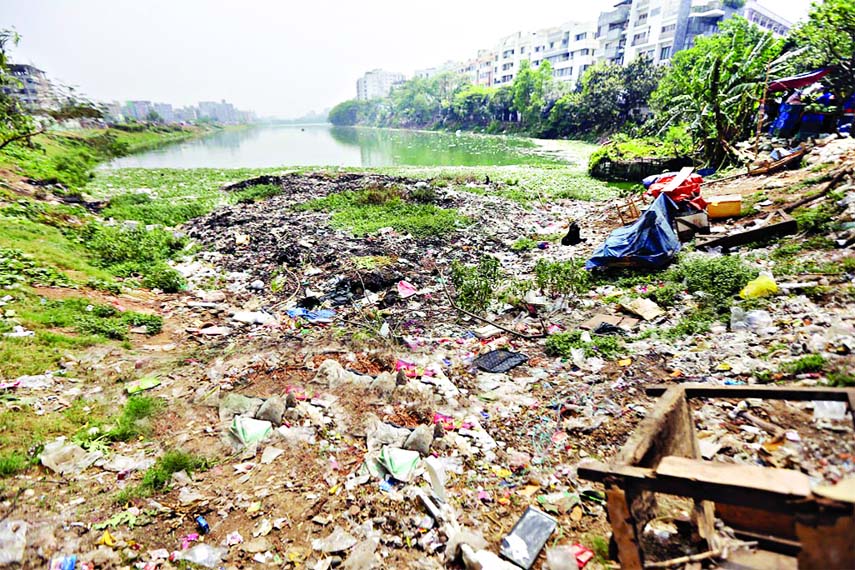
Staff Reporter :
Water bodies and dumping of garbage probably go hand in hand in Bangladesh. Almost all the major lakes or canals in the country’s urban or semi-urban areas are dumping grounds of waste due to the continuous negligence of the government agencies.
The nearly 300 acres Gulshan lake that once used to produce gentle breeze with fragrance of sweet flowers now creates a pervasive odour flowing constantly, creating health hazards for the people living in adjacent areas. Even after the issuance of a HC rule in February, 2016 – seeking explanation why dumping waste and sewerage in the lake should not be declared illegal – indiscriminate dumping of waste and rubbish continues unabated, heavily polluting the water body as well as its environs.
According to a study conducted by Asia Pacific University of Bangladesh, above 200 sewerage pipes from the lakeside houses discharge tons of human waste and household trashes into the lake every day. As some areas of Gulshan, Banani and Niketan do not have sewerage system of WASA, the misdeed goes unabated, making the water of the lake most polluted among the city’s five lakes, said the study.
Mentionable, developed in 1961 as a residential area, Gulshan is now home to the majority of embassies and foreign missions in Dhaka, besides accommodating a number of the city’s luxury restaurants, shopping centres, schools and elite clubs.
Despite strict laws regarding wastage dumping in water bodies, it remains a challenge for everybody to find a solution.
Water bodies and dumping of garbage probably go hand in hand in Bangladesh. Almost all the major lakes or canals in the country’s urban or semi-urban areas are dumping grounds of waste due to the continuous negligence of the government agencies.
The nearly 300 acres Gulshan lake that once used to produce gentle breeze with fragrance of sweet flowers now creates a pervasive odour flowing constantly, creating health hazards for the people living in adjacent areas. Even after the issuance of a HC rule in February, 2016 – seeking explanation why dumping waste and sewerage in the lake should not be declared illegal – indiscriminate dumping of waste and rubbish continues unabated, heavily polluting the water body as well as its environs.
According to a study conducted by Asia Pacific University of Bangladesh, above 200 sewerage pipes from the lakeside houses discharge tons of human waste and household trashes into the lake every day. As some areas of Gulshan, Banani and Niketan do not have sewerage system of WASA, the misdeed goes unabated, making the water of the lake most polluted among the city’s five lakes, said the study.
Mentionable, developed in 1961 as a residential area, Gulshan is now home to the majority of embassies and foreign missions in Dhaka, besides accommodating a number of the city’s luxury restaurants, shopping centres, schools and elite clubs.
Despite strict laws regarding wastage dumping in water bodies, it remains a challenge for everybody to find a solution.

